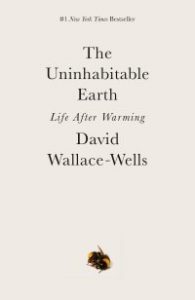There are real, existential problems that humanity needs to worry about.

NYT, 28 Feb 2022: Time Is Running Out to Avert a Harrowing Future, Climate Panel Warns
Subtitled: “The impacts of global warming are appearing faster than expected, according to a major new scientific report. It could soon become much harder to cope.”
The dangers of climate change are mounting so rapidly that they could soon overwhelm the ability of both nature and humanity to adapt, creating a harrowing future in which floods, fires and famine displace millions, species disappear and the planet is irreversibly damaged, a major new scientific report has concluded.
Much detail in this NYT piece. Yet scientists and international organizations have been issuing reports like this every couple of years, for decades I’d wager, and few people seem to the care. Republicans, for example, are more concerned about erasing history and kinds of people they disapprove of from school classrooms, never mind the kind of future those kids will grow up in. And so now we have:
NYT, 1 March 2022: These Climate Scientists Are Fed Up and Ready to Go on Strike
Subtitled: “Evidence on global warming is piling up. Nations aren’t acting. Some researchers are asking what difference more reports will make.”
Referring to the report discussed in the previous link,
For scientists of many kinds, the coronavirus pandemic has fueled the sense that scientific experts and political authorities are uneasy allies at best, that distrust and misinformation have weakened society’s capacity to work toward complex collective goals.
These thoughts were percolating as Dr. Glavovic worked alongside nearly 270 other experts on the latest report by the Intergovernmental Panel on Climate Change, the United Nations body that assesses climate research. The new report, all 3,675 pages of it, was issued on Monday and concludes that global warming is outpacing our ability to cope.
Each I.P.C.C. assessment is a huge, multiyear effort by researchers and representatives from 195 governments. Every line, every chart, is fine-tuned to ensure it is backed by evidence. The hours are long; the work is unpaid. The panel, which shared the Nobel Peace Prize in 2007, has given global climate talks a crucial grounding in scientific fact. But its reports deliberately do not prescribe policies for governments to enact. They just lay out the options.
To Dr. Glavovic, the panel’s efforts made clear long ago what the world needs to do. He thinks everybody’s time and energy would be better spent making sure it gets done.
The very first thing to do, if anyone cares about the future in which children and grandchildren will live, is captured in the title of this LAT editorial. (I just subscribed to LAT online-only for 6 months for $1. After that I’ll see how useful it is. I have a similar temp deal subscribing online to the Washington Post. Even without subscriptions, sites like these allow a few free articles per month.)
LAT editorial, 9 March 2022: Editorial: What’s better than a ban on Russian oil imports? Ending our dependence on fossil fuels
\
The photo at top shows the burning of the Amazon Rain forest, but it’s a reminder that, even by burning fossil fuels, humanity is literally burning up the planet.
\
Something of an aside:
And now with the Ukraine war and bans on Russian oil and Americans’ complaints about their god-given right to drive enormous trucks, we are seeing schadenfreude toward drivers of those enormous American trucks. Here’s a piece about the danger just of their physical size, to pedestrians, who can barely be seen over hoods that are five feet off the ground.
Slate, 28 Feb 2022: Killer Truck, Dude, subtitled, “How will you feel when it actually does?”
\\
Another issue:
Salon, 24 Feb 2022: Sea levels have been rising since the American Civil War. The reason? Coal
Subtitled: “The burning of coal in the Victorian Era inadvertently caused nineteenth-century climate change”
There is broad consensus at this point that climate change started in the mid-19th century, and little doubt that burning fossil fuels, primarily coal, is the cause.
\\
Let me mention again The Uninhabitable Earth: Life After Warming, by David Wallace-Wells, which lays out in readable detail (though the book was published 2 years ago), the evidence of climate change and trends for the future.
The messages of this book, which I’ve read and will write up here soon, are two:
1, It’s not just about rising sea levels. There are/will be many other effects.
2, Projections of the effects of climate change typically go the end of this century. But the 22nd century will be much worse.
It’s remarkable in a way that these changes are happening so quickly; even if over a couple centuries, that’s an eye blink in the context of geological time, or the history of life on Earth.
\\
But again, problems like this, which occur over the span of several generations, seem simply irrelevant to many people, disregarded if not as yet another conspiracy by scientists and other liberal eggheads, then because if won’t affect them in their own lifetimes. Yet more evidence, I fear, that human intelligence, and its ability to solve problems that threaten its existence, have already hit a ceiling.
\\
The other major existential threat, of course, is that of nuclear war. With the end of the Cold War in the 1990s, the threat seemed to retreat. But now with Putin being backed into a corner, it seems more plausible that a rogue like him could launch nuclear warheads out of spite, or desperation. And then what would happen?






